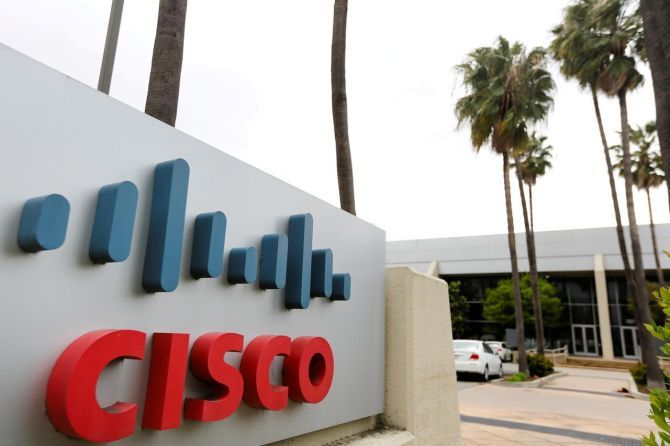It is eyeing the transportation and infrastructure modernisation opportunity in the country, expected to attract $500 billion in investment over the next five years.

Quantum cryptography that could propel India to the forefront of hack-proof communication.
Li-Fi that uses light as a medium to transfer data at high speed.
Internet of Things (IoT) devices that are helping airlines for faster turnaround of aircraft.
These are some of the innovations by start-ups that are being nurtured by Cisco as part of its ‘accelerator’ programme.
The US-based maker of computer networking gear is engaging with Indian start-ups through a Cisco LaunchPad programme, to get feedback and understand the innovations in areas such as IoT, artificial intelligence (AI), machine learning and cyber security.
These it sees as giving it “an ability to understand which technologies are getting traction and what it takes to build these in an agile manner and which are complementary to our focus areas”, explains Krishna Sundaresan, vice-president of engineering at Cisco Systems.
“It also gets us the real-world feedback on which ones are working and which ones are not.”
Cisco’s machines form the backbone of the Internet.
The company is providing support for India’s national broadband effort, the creation of ‘smart cities’ and the modernisation of defence.
It is eyeing the transportation and infrastructure modernisation opportunity in the country, expected to attract $500 billion (Rs 35 trillion) in investment over the next five years.
Experts say Cisco is wooing start-ups as part of a strategy to tap such projects.
Rishikesha Krishnan, professor of strategy at the Indian Institute of Management here, says Cisco’s products are increasingly becoming part of complex systems.
For example, the smart city projects being implemented are much more than the routers and networking equipment that are Cisco's traditional strengths.
“So, Cisco wants to engage with companies, especially start-ups, working on new technologies in emerging application areas that could be used to fill out the requirements for new opportunities such as smart cities,” said Krishnan.
“It also gives Cisco an opportunity to see how technologies such as blockchain and AI are getting deployed.”
One such cutting-edge tech start-up that was part of Cisco’s acceleration programme is QNu Labs.
This, goes the claim, is India's first and only company to develop Quantum Cyber-Security Products.
It is in the business of future-proofing encryption through quantum technologies.
Which technology could propel India to the forefront of hackproof communication in sectors such as banking and national and homeland security.
“We are working actively with the government and have identified at least 20 use cases,” said Sunil Gupta, co-founder and chief executive of the Bengaluru-based start-up. He says there are millions of Cisco routers and switches in the network; instead of replacing these, they can be upgraded.
“Our idea is that you put my boxes (quantum crypotography devices) along with the Cisco hardware,” said Gupta.
The innovation comes when Cisco blocks close to 20 billion internet threats a day.
Under its accelerator programme, other than mentorship, Cisco also helps the start-ups target customers, validate the technology, connect with investors and access the market.
For instance, it is helping Hyderabad-based Zestiot to enter the international market.
Zestiot has created an IoT aviation platform which is filing applications at airlines and airports for faster turnaround of planes and to improve on-time performance.
The platform is helping in real-time visibility of turnaround operations, avoiding of delays and improving the utilisation of ground equipment.
“We don’t touch the aircraft -- we touch everything around the aircraft and use IoT (to get the insights),” says Amit Sukhija, founder and chief executive at Zestiot.
Also having caught the attention of Cisco is Delhi-based Velmenni.
It is working on Li-Fi technology for wireless data transfer, using light as a medium.
Li-Fi potentially offers 10 times the efficiency of traditional Wi-Fi, facilitating high-speed data communication of up to 1 Gbps.
Velmenni’s focus is to solve the challenges for back-haul connectivity in fourth and fifth-generation mobile telecom technology (4G and 5G); also, to create a parallel infrastructure to Wi-Fi.
“We are doing the proof-of-concept in the US, Europe and India,” said Deepak Solanki, founder and head.
Another company, Uncanny Vision, part of Cisco’s LaunchPad, is giving machines an ability to see and analyse like humans, using AI.
For instance, one of its products enables surveillance cameras to ‘see’ and ‘understand’ their environment instantly, using AI and deep learning algorithms.
In comparison, most of the 300 million surveillance cameras today are ‘blind’, only video-recording for post-incident manual analysis.
Cisco says these hi-tech start-ups are also its acquisition targets.
“When they become innovative enough, we might invest or acquire them,” said Sundaresan.
Photograph: Elijah Nouvelage/Reuters













 © 2025
© 2025